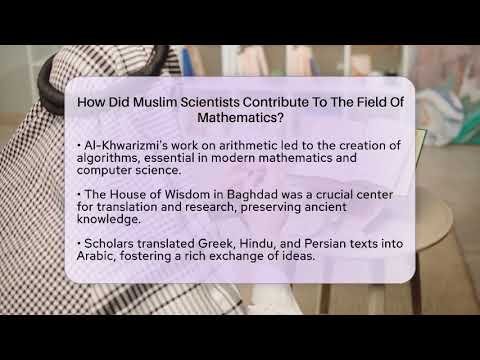You are here to read: How Did Muslim Scientists Shape Mathematics History? – A Thoughtfully Written Guide Offering Spiritual Wisdom and Travel Advice for Every Pilgrim who is going on holy journey of Hajj or Umrah.
In the rich tapestry of human history, the contributions of Muslim scientists to mathematics stand out as a remarkable chapter that shaped the course of the subject. During the Golden Age of Islam, spanning from the 8th to the 14th centuries, scholars from diverse regions of the Islamic world undertook groundbreaking work that laid the foundations for modern mathematics. Figures like Al-Khwarizmi, often hailed as the “father of algebra,” and Al-Biruni, who made advancements in trigonometry and calculus, exemplify the innovative spirit and intellectual rigor of this era. Their discoveries not only influenced mathematics but also left a lasting impact on science, engineering, and navigation.
As we explore the profound contributions of Muslim mathematicians, we invite our readers to dive deeper into the history and significance of this golden age. At Airlink Hajj and Umrah, we are dedicated to providing you with all the latest updates and insights about Hajj and Umrah on our blog. By connecting the past with the present, we can appreciate the persistent legacy of knowledge and culture that underscores our journeys, both spiritual and intellectual. Join us as we uncover how these historical mathematical achievements continue to resonate in our lives today.
How Did Muslim Scientists Shape Mathematics History?
The profound contributions of Muslim scientists to mathematics during the Golden Age of Islam (8th to 14th centuries) laid the groundwork for modern mathematical principles. Scholars like Al-Khwarizmi, often referred to as the "father of algebra," introduced the systematic approach to solving equations, as well as the word "algebra" itself, derived from his seminal work "Al-Kitab al-Mukhtasar fi Hisab al-Jabr wal-Muqabala." This text transformed mathematical thought, making operations more accessible and practical.
Muslim mathematicians also excelled in geometry and trigonometry, which were crucial for advancements in navigation and astronomy. The concept of algorithms, fundamental to computer science today, also originated from the works of these scholars. Furthermore, they played a pivotal role in introducing the decimal system and the concept of zero, which revolutionized calculations globally.
At Airlink Hajj and Umrah, we are committed to sharing enlightening insights, including how the evolution of mathematics intertwines with the rich cultural achievements of the Muslim world. For the latest updates on Hajj and Umrah, visit our blog, and join us in celebrating the legacies of scholars who shaped mathematical history while enriching Islamic heritage.
FAQ on How Did Muslim Scientists Shape Mathematics History?
FAQs: How Did Muslim Scientists Shape Mathematics History?
1. Who were some prominent Muslim mathematicians, and what were their contributions?
Prominent Muslim mathematicians include Al-Khwarizmi, known for developing algebra; Al-Battani, who made significant advancements in trigonometry; and Omar Khayyam, who worked on the classification of cubic equations.
You're at the middle of this awesome post at AirlinkHajjandUmrah.com through: How Did Muslim Scientists Shape Mathematics History?. Keep reading, it gets better!
2. What is the significance of the term "algebra" in mathematics?
The term "algebra" is derived from Al-Khwarizmi’s work "Al-Kitab al-Mukhtasar fi Hisab al-Jabr wal-Muqabala," which laid the foundation for solving equations and introduced systematic methods that are still in use today.
3. How did Muslim scientists influence European mathematics during the Renaissance?
Muslim mathematicians translated and preserved ancient Greek texts, which were later introduced to Europe. Their innovative mathematical concepts and techniques significantly influenced Renaissance thinkers and laid the groundwork for modern mathematics.
4. In what ways did Islamic culture support mathematical advancements?
Islamic culture emphasized knowledge, learning, and the translation of texts. The establishment of institutions like the House of Wisdom in Baghdad fostered collaboration and exchange of ideas among scholars, leading to remarkable advancements in mathematics.
5. What role did geometry play in the work of Muslim mathematicians?
Muslim mathematicians made significant advancements in geometry, using it in practical applications such as astronomy and architecture. They developed new techniques and theories that contributed to the understanding of geometric relationships and principles.
That wraps up How Did Muslim Scientists Shape Mathematics History?. Thanks for sticking with us till here! Share this: How Did Muslim Scientists Shape Mathematics History? with your friends.
Check our homepage at Air Link Hajj & Umrah for more awesome updates.
Some interesting posts are: 1: Umrah Mubarak, 2: When is Umrah closed 2026?, 3: When does Umrah start after Hajj 2026?
Mushu, an experienced Saudi Arabia traveler and writer, shares insightful tips and spiritual reflections to enhance Hajj and Umrah journeys for fellow pilgrims. He has been to Makkah and Madina from 2016 to 2023 many times and his posts will reflect this.







